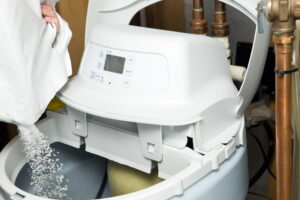Well, ideally nothing. This sounds like a problem for your prospective plumber who has access to solutions that we’ll get to below. But trying to solve this problem DIY is never really a good idea.
Hard water is more of a matter of chemistry than it is a physical problem you can fix. You can’t just reach your hand into your water supply and pull out the minerals, they’re dissolve to a microscopic level, even where a filter wouldn’t be able to help much. A water softener is going to be your best bet, and it’s an incredibly simple water treatment system in Vinton, IA. It uses a bit of chemistry to remove all of the minerals from your water while keeping your plumbing system from getting overwhelmed.
Let’s talk about how this system works, why it’s so helpful, and how you can get started on your journey towards having a hard water treatment system like a water softener installed in your home.
Is Hard Water Dangerous?
The short answer is no, but it’s not quite good for your plumbing system. You can drink and bathe in hard water without any serious negative effects (we’ll get into that down below), but your plumbing system is going to deteriorate if it comes into contact with too many minerals in the water.
Minerals can dissolve in water like they do in your hard water supply, but they’ll quickly solidify and create layers of sediment all throughout your plumbing system. Inside of pipes, in your water heater, your washing machine, and even on the floor of your bathtub, you’ll see things like limescale and other minerals start to form. These can be a pain to remove and they’re also likely forming in places where you can’t remove them. Eventually, they’ll block up your plumbing system and cause you to invest in repiping, which can be expensive.
Long story short, hard water isn’t dangerous but it can deteriorate your plumbing system to dangerous levels.
The Negative Health Effects of Hard Water
We briefly touched on the negative health effects of hard water, but we’d like to go into more detail for curious customers.
While yes, you can drink and use hard water for your personal hygiene safely, it’s going to give you some side effects that you’d probably rather avoid. For instance, mineral water can impact people’s diets in certain ways, and if you already take vitamin supplements, added minerals could cause some minor shifts that you might not be thrilled about.
Also, hard water can be brutal on your hair, skin, and scalp. It’s more abrasive than regular water, and it will cause your skin to dry out and your hair to become thin. Some people don’t care about these effects, but if you’re buying expensive shampoos and body washes to make your skin feel moist and your hair feel full, then you’re going to be better off with soft water.
How a Water Softener Works
A water softener works by removing the minerals from your water with a simple salt-brine solution and ionization. The ions attach to the minerals and allow them to be collected into the brine solution which would eventually need to be changed out. But it’s a simple chemical reaction that works perfectly every time.
Just make sure, to avoid leaks and other complicated problems, you hire a professional to install this system in your home.
At Dalton Plumbing, Heating, Cooling, Electric and Fireplaces, Inc., your comfort is our promise! To set up an appointment in the Cedar Rapids area, give us a call at the number above, email customerservice@daltonphc.com or schedule an appointment online.

